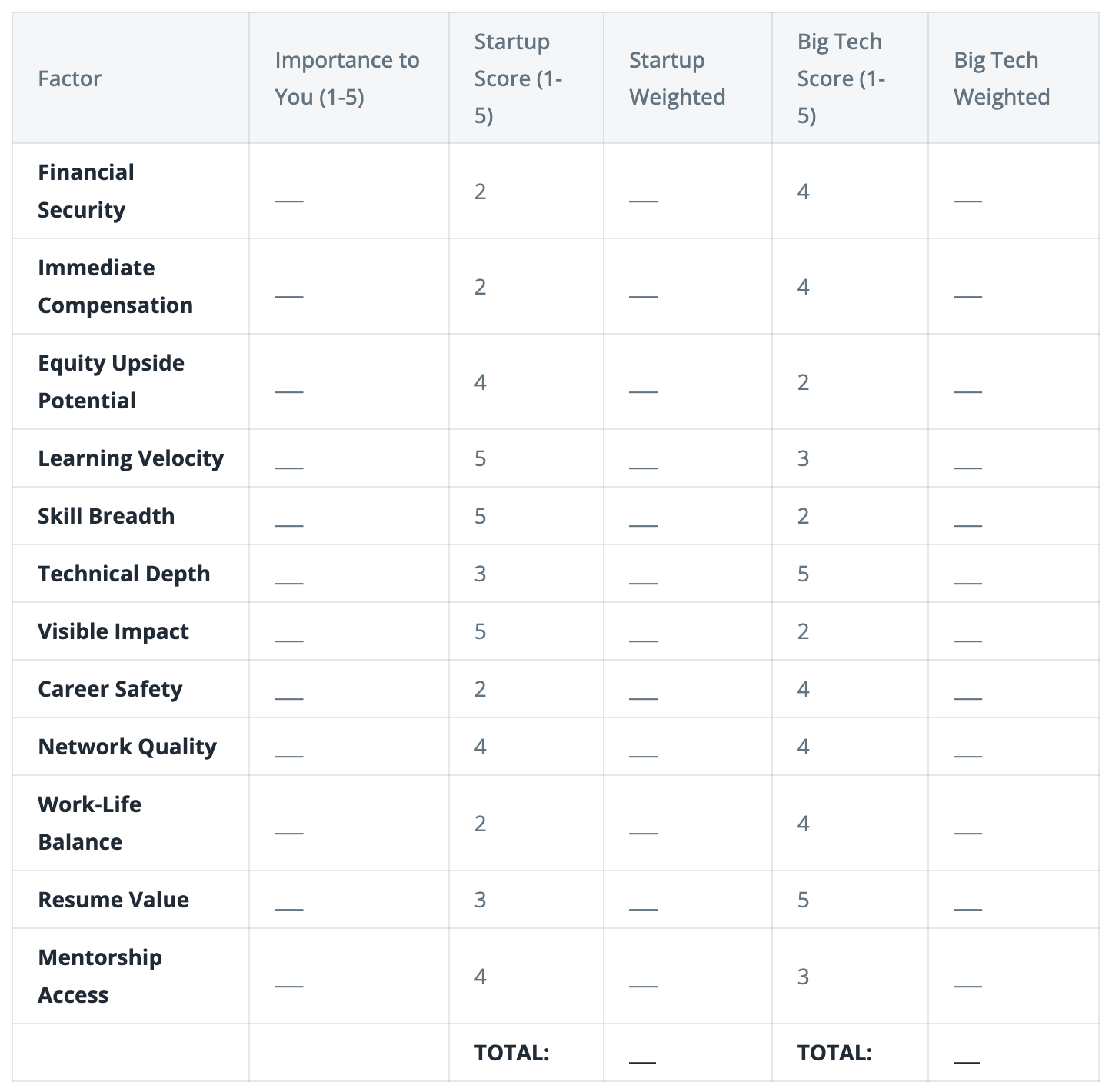"Should I join a start up or Big Tech?"
Big Tech stock compensation retains its full value. You're dealing with profitable public companies, not startups burning cash.
Treat startup equity as a lottery ticket that might never pay off. If you need real money for financial planning, prioritize guaranteed compensation. Startup millionaire stories make headlines precisely because they're exceptional. But if you're young and like risk, it may be the right fit.
While the compensation discussion gets all the attention, it's not what determines where your career goes over the next five years. I've watched too many engineers optimize for the wrong things and then wonder why they're stuck in the same type of role three years later.
What actually drives career outcomes starts with team quality, which matters more than almost anything else and compounds in ways that aren't obvious. Working with people significantly better than you accelerates growth faster than any training program. Startups give you direct access to founders and senior people who can mentor you meaningfully. Big Tech teams can be incredible too, but it's more variable. You might land with world-class engineers or people just good at navigating corporate systems.
Beyond who you work with, the learning environment shapes how quickly you develop. Startups throw you into the deep end immediately. CI/CD, database performance, customer escalations becomes your responsibility because there's nobody else. This breadth makes you more valuable and confident, plus you'll learn how businesses actually work, which most Big Tech engineers never see.
Big Tech offers incredible depth and scale instead. You'll work with best-in-class tools serving millions of users, with formal training startups can't provide. The tradeoff is you become excellent at working within established frameworks rather than building them from scratch.
The third factor is how visible your contributions become. Your startup work directly moves the needle on company success. You'll ship features that affect key metrics and make architectural decisions that shape the entire product. Big Tech impact is more diffuse. You might serve millions of users, but your individual contribution gets lost in the machine.
Given these trade-offs, Take the path that will teach you the most in the shortest time, even if it pays less initially. Your next job will be determined more by what you learned and who you worked with than how much you got paid. Choose the environment that will stretch your skills most aggressively.
Most people are terrible at honestly evaluating their own risk tolerance. They think they're comfortable with uncertainty until they're actually living with it, or they think they need safety until they realize how boring and limiting it can be.
Financial risk is straightforward to assess. Take your startup offer and subtract the equity value entirely. Can you live comfortably on what's left? If losing that equity component would genuinely hurt your financial goals, you're essentially gambling with money you need.
Career risk is harder to evaluate but equally important. Startup failure makes you attractive to other startups but less so to Big Tech companies that prefer traditional backgrounds. Meanwhile, Big Tech experience opens doors everywhere but can leave you pigeonholed into specific technologies that don't translate well to smaller companies.
Be honest about where you are in life. If you're early in your career with few financial obligations, startup risk is manageable. If you have a mortgage and kids, the calculation changes completely. Your risk tolerance evolves over time, so the startup path that made sense at 25 might be irresponsible at 35, while the Big Tech role that felt stifling early on might provide exactly the stability you need later.
Once you've figured out your priorities, you need to evaluate specific opportunities properly. Most people get seduced by surface-level signals and miss the underlying health of the company or team they'd actually be joining.
Everyone gets distracted by funding headlines and big valuations, but those numbers don't tell you much about whether a company is actually healthy. Revenue growth, customer retention, and burn rate matter more than how much money they've raised. Ask about monthly recurring revenue, customer churn, and how long their current funding will last. If they won't give you straight answers, that's your answer.
For Big Tech roles, the team and manager matter more than the company brand. Ask to meet your potential teammates and manager during the interview process. Find out what the team has shipped recently, how decisions get made, and recent promotion stories. Some Big Tech teams operate like well-funded startups while others are bureaucratic nightmares.
The questions that reveal trajectory are simple but telling. At startups, ask about their path to profitability and what happens if they can't raise their next round. At Big Tech, ask about the team's roadmap and how it fits into the company's broader strategy. Teams that can't articulate their future clearly usually don't have much of one.
Warning signs exist in both environments. Startups that talk more about their vision than their customers, or that have been fundraising for months without closing a round, are probably in trouble. Big Tech teams with high turnover, vague job descriptions, or managers who can't explain why the role exists are equally problematic. Trust your instincts when something feels off during the interview process.
No matter how exciting the opportunity seems on paper, you're better off with a mediocre company that's honest about their situation than a potentially great one that hides critical information. The best opportunities come from companies confident enough in their fundamentals to discuss them openly.
When it comes to decision time, start with the five-year vision test. Write down where you want to be in five years, not just job title but actual skills, network, and financial situation. Which path gets you closer to that vision? Skipping this step often leads to feeling directionless later on.
Once you have that clarity, apply Jeff Bezos' regret minimization approach. When you're 80, which choice will you regret more? Taking the safe Big Tech job and wondering what could have been, or taking the startup risk and ending up 5 years behind your peers? This cuts through all the rational analysis and gets to what you actually care about.
These two exercises should give you strong intuition about which direction feels right. But if you're still torn between competing priorities, consider creating a simple decision matrix to help you weigh the trade-offs. Rate each factor from 1-5 based on importance to you, then score how well each option meets that need. Multiply importance × score for weighted totals.
Whatever the matrix reveals, accept that you can't optimize for everything. You can't have maximum safety, maximum upside, maximum learning, and maximum work-life balance all at once. Pick your top two priorities and optimize for those. Everything else is secondary.
Once you've identified those priorities, set a deadline and stick to it. Give yourself one week to gather information, talk to people, and think it through. After that, decide and move on. Analysis paralysis helps nobody, and both paths can work if you commit to making them work.
This choice shapes your next three to five years more than most people realize. The skills you develop, the network you build, and the career capital you accumulate will determine your options for the next several moves. Choose based on where you want to go, not just where you are now.
The most common mistake is optimizing for the wrong timeframe. People either focus too much on immediate compensation or get lost in unrealistic long-term scenarios. Think in terms of your next two jobs, not your entire career or just this year's salary.
Once you decide, commit fully. Half-hearted startup employees get laid off first. Disengaged Big Tech employees get stuck in dead-end roles. Whichever path you choose, lean into it and make the most of the opportunities it provides.
Both paths can lead to successful careers if you approach them strategically. The only real mistake is choosing for the wrong reasons or not choosing at all. Make your decision and get to work. Good luck!
People are constantly asking us what’s new with Hello Interview, so we’re going to keep a changelog here to keep you up-to-date. Since our last update:
New Features:
New Content:
We’ve got more coming down the pipe that we’re excited to share in our next update!













